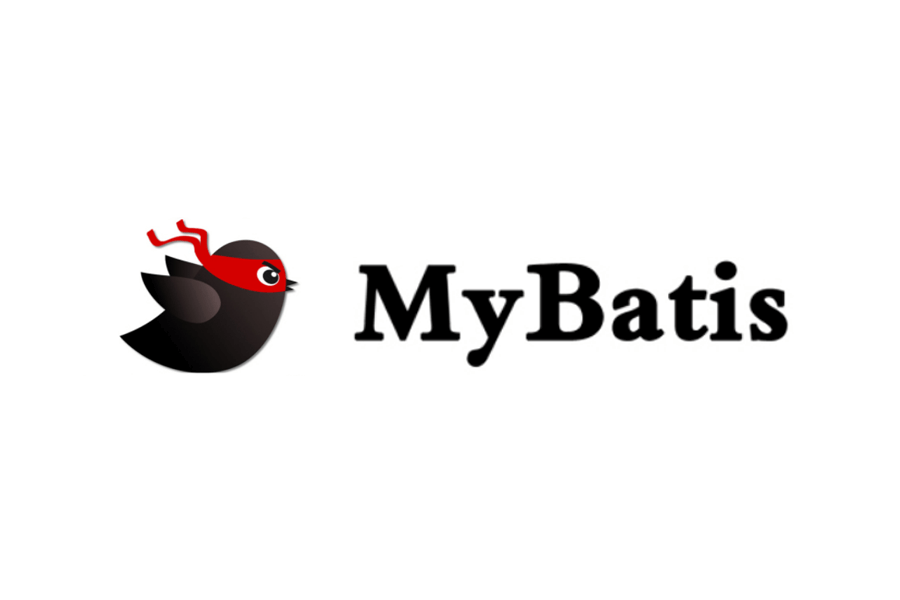1. spring创建bean的三种方式
1.1 使用默认构造函数创建。
在spring的配置文件中使用bean标签,配以id和class属性之后,且没有其他属性和标签时采用的就是默认构造函数创建bean对象,此时如果类中没有默认构造函数,则对象无法创建
beans.xml
1
2
3
4
5
6
7
8
| <?xml version="1.0" encoding="UTF-8"?>
<beans xmlns="http://www.springframework.org/schema/beans"
xmlns:xsi="http://www.w3.org/2001/XMLSchema-instance"
xsi:schemaLocation="http://www.springframework.org/schema/beans
http://www.springframework.org/schema/beans/spring-beans-3.1.xsd">
<bean id="accountService" class="com.spring.service.impl.AccountServiceImpl"></bean>
</beans>
|
service实现类
1
2
3
4
5
6
7
8
9
10
11
12
13
14
15
| package com.spring.service.impl;
import com.spring.service.IAccountService;
public class AccountServiceImpl implements IAccountService {
public AccountServiceImpl(){
System.out.println("对象创建了");
}
public void saveAccount(){
System.out.println("service中的saveAccount方法执行了");
}
}
|
使用spring的IOC获取实现类对象
1
2
3
4
5
6
7
8
9
10
11
12
13
14
15
16
17
18
19
20
| package com.spring.ui;
import com.spring.service.IAccountService;
import org.springframework.context.ApplicationContext;
import org.springframework.context.support.ClassPathXmlApplicationContext;
public class Client {
public static void main(String[] args) {
ApplicationContext ac = new ClassPathXmlApplicationContext("spring-bean.xml");
IAccountService as = (IAccountService) ac.getBean("accountService");
System.out.println(as);
}
}
|
输出结果

如果此时将实现类中的默认构造函数覆盖成有参构造函数,程序运行后会报错,提示没有默认构造函数


1.2 使用普通工厂中的方法创建对象(使用某个类中的方法创建对象,并存入spring容器)
创建一个工厂类,通过工厂类中的getAccountService方法返回一个AccountServiceImpl对象
工厂类
1
2
3
4
5
6
7
8
9
10
11
12
13
14
| package com.spring.factory;
import com.spring.service.IAccountService;
import com.spring.service.impl.AccountServiceImpl;
public class InstanceFactory {
public IAccountService getAccountService(){
return new AccountServiceImpl();
}
}
|
beans.xml
第一个bean配置的是工厂类的id和全限定类名,第二个bean配置的是使用spring的IOC获取对象的id,
“factory-bean”属性配置的是上一个bean中工厂类的id,“factory-method”配置的是工厂类中获取对象的方法名

1
2
3
4
5
6
7
8
9
10
| <?xml version="1.0" encoding="UTF-8"?>
<beans xmlns="http://www.springframework.org/schema/beans"
xmlns:xsi="http://www.w3.org/2001/XMLSchema-instance"
xsi:schemaLocation="http://www.springframework.org/schema/beans
http://www.springframework.org/schema/beans/spring-beans-3.1.xsd">
<bean id="instanceFactory" class="com.spring.factory.InstanceFactory"></bean>
<bean id="accountService" factory-bean="instanceFactory" factory-method="getAccountService"> </bean>
</beans>
|
1.3 使用工厂中的静态方法创建对象(使用某个类中的静态方法创建对象,并存入spring容器)
创建一个工厂类,通过工厂类中的静态getAccountService方法返回一个AccountServiceImpl对象
工厂类
1
2
3
4
5
6
7
8
9
10
11
12
13
14
| package com.spring.factory;
import com.spring.service.IAccountService;
import com.spring.service.impl.AccountServiceImpl;
public class staticFactory {
public static IAccountService getAccountService(){
return new AccountServiceImpl();
}
}
|
beans.xml
1
2
3
4
5
6
7
8
9
| <?xml version="1.0" encoding="UTF-8"?>
<beans xmlns="http://www.springframework.org/schema/beans"
xmlns:xsi="http://www.w3.org/2001/XMLSchema-instance"
xsi:schemaLocation="http://www.springframework.org/schema/beans
http://www.springframework.org/schema/beans/spring-beans-3.1.xsd">
<bean id="accountService" class="com.spring.factory.staticFactory" factory-method="getAccountService"></bean>
</beans>
|
bean的作用范围调整
bean标签的scope属性用于指定bean的作用范围,常用的是单例和多例
singleton:单例(默认值)
prototype:多例
request:作用于web应用的请求范围
session:作用于web应用的会话范围
global-session:作用于集群环境的会话范围(全局会话范围),当不是集群环境时,它就是session
当使用singleton属性时,对象只被创建了一次
1
| <bean id="accountService" class="com.spring.service.impl.AccountServiceImpl" scope="singleton"></bean>
|
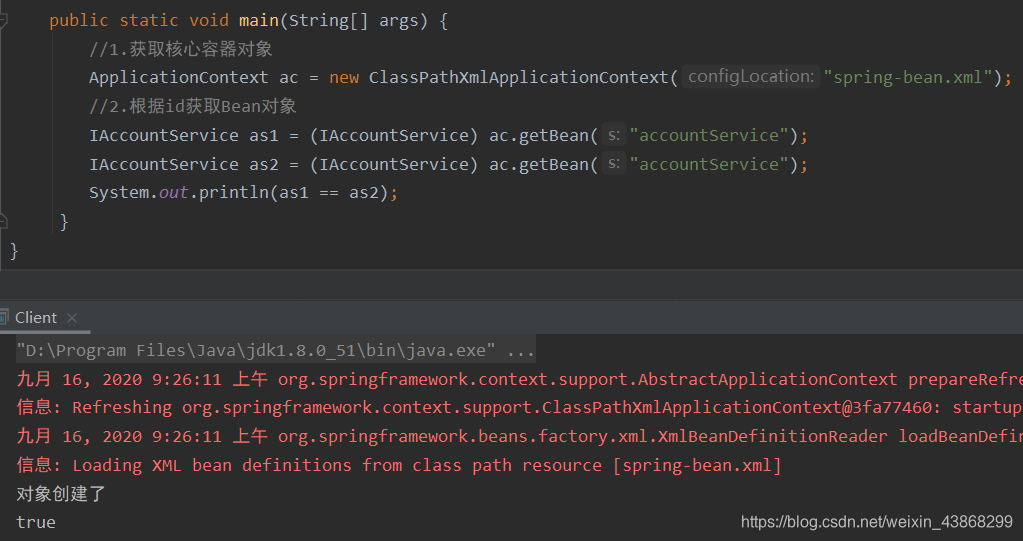
当使用prototype属性时,对象只被创建了两次次
1
| <bean id="accountService" class="com.spring.service.impl.AccountServiceImpl" scope="prototype"></bean>
|

bean对象的生命周期
单例对象
出生:当容器创建时对象出生
活着:只要容器还在,对象一直活着
死亡:容器销,对象消亡
总结:单例对象的生命周期和容器相同
多例对象
出生:当我们使用对象时spring框架为我们创建
活着:对象只要是在使用过程中就一直活着
死亡:当对象长时间不用,且没有别的对象引用时,由]ava的垃圾回收器回收
2. spring的依赖注入
spring的IOC的作用是降低程序间的耦合(依赖关系),依赖关系的管理都交给spring来维护, 在当前类需要用到其他类的对象,由spring为我们提供,我们只需要在配置文件中说明。依赖关系的维护就称之为依赖注入( Dependency Injection )
依赖注入能注入的数据有三类:基本类型和String、其他bean类型(在配置文件中或者注解配置过的bean)、 复杂类型/集合类型
注入的方式有三种:使用构造函数提供、使用set方法提供、使用注解提供
2.1 构造函数注入
构造函数注入是在bean标签的内部使用的“constructor-arg”标签
标签中的属性:
type:用于指定要注入的数据的数据类型,改数据类型也是构造函数中某个或某些参数的类型
index:用于指定要注入的数据给构造函数中指定索引位置的参数赋值,索引的位置是从0开始
name:用于指定给构造函数中指定名称的参数赋值(常用)
(以上三个属性用于指定给构造函数中哪个参数赋值)
value:用于提供基本类型和String类型的数据
ref:用于指定其他的bean类数据,它指的就是在spring的Ioc核心容器中出现过的bean对象
实例
创建一个实现类,在类中定义三个变量,分别为基本类型Interger的age、String类型的name和java.util.Date类型的birthday。覆写带这三个参数的构造方法
实现类
1
2
3
4
5
6
7
8
9
10
11
12
13
14
15
16
17
18
19
20
21
22
23
24
25
| package com.spring.service.impl;
import com.spring.service.IAccountService;
import java.util.Date;
public class AccountServiceImpl implements IAccountService {
private String name;
private Integer age;
private Date birthday;
public AccountServiceImpl(String name,Integer age,Date birthday){
this.name = name;
this.age = age;
this.birthday = birthday;
}
public void saveAccount(){
System.out.println("service中的saveAccount方法执行了---姓名:"+name+",年龄:"+age+",生日:"+birthday);
}
}
|
spring配置文件
其中birthday的类型是java.util.Date,所有不能直接使用value,而要使用ref,同时需要写一个java.util.Date的Bean通过spring获取Date对象
1
2
3
4
5
6
7
8
|
<bean id="accountService" class="com.spring.service.impl.AccountServiceImpl">
<constructor-arg name="name" value="张三"></constructor-arg>
<constructor-arg name="age" value="18"></constructor-arg>
<constructor-arg name="birthday" ref="now"></constructor-arg>
</bean>
<bean id="now" class="java.util.Date"></bean>
|
运行结果
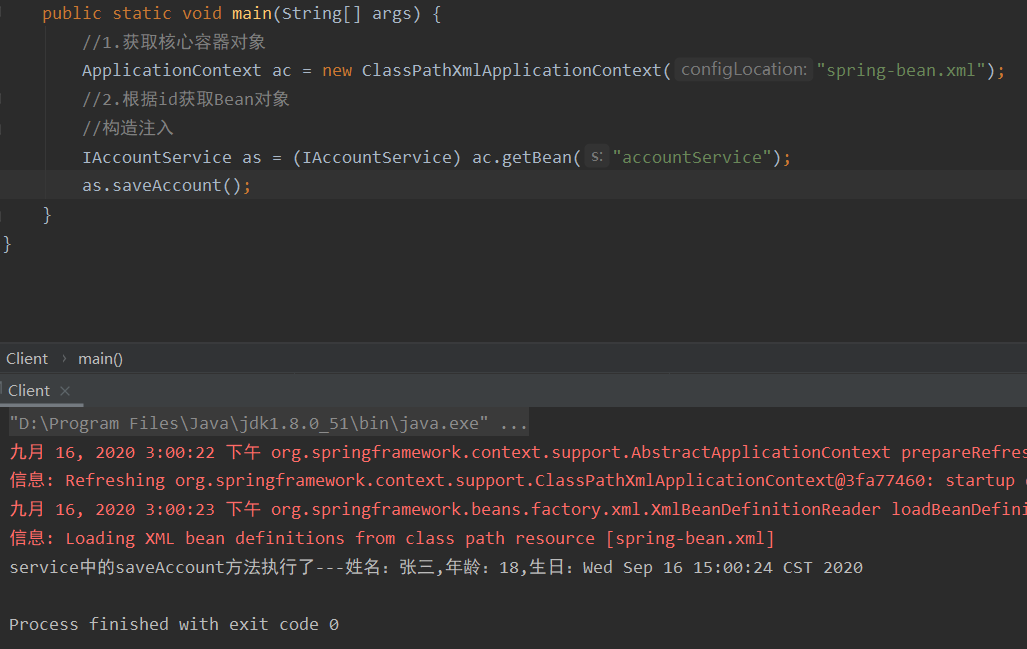
优势:在获取bean对象时,注入数据是必须的操作,否则对象无法创建成功。
弊端:改变了bean对象的实例化方式,使我们在创建对象时,如果用不到这些数据,也必须提供。
2.2 使用set方法注入(常用)
set方法注入是在bean标签的内部使用的“property”标签
标签的属性:
name:用于指定注入时所调用的set方法名称
value:用于提供基本类型和String类型的数据
ref:用于指定其他的bean类型数据。它指的就是在spring的Ioc核心容器中出现过的bean对象
实例
创建一个实现类,在类中定义三个变量,分别为基本类型Interger的age、String类型的name和java.util.Date类型的birthday,并添加相应的set方法
实现类
1
2
3
4
5
6
7
8
9
10
11
12
13
14
15
16
17
18
19
20
21
22
23
24
25
26
27
28
29
30
31
| package com.spring.service.impl;
import com.spring.service.IAccountService;
import java.util.Date;
public class AccountServiceImpl2 implements IAccountService {
private String name;
private Integer age;
private Date birthday;
public void setName(String name) {
this.name = name;
}
public void setAge(Integer age) {
this.age = age;
}
public void setBirthday(Date birthday) {
this.birthday = birthday;
}
public void saveAccount(){
System.out.println("service中的saveAccount方法执行了---姓名:"+name+",年龄:"+age+",生日:"+birthday);
}
}
|
spring配置文件
其中birthday的类型是java.util.Date,所有不能直接使用value,而要使用ref,同时需要写一个java.util.Date的Bean通过spring获取Date对象
1
2
3
4
5
6
7
|
<bean id="accountService2" class="com.spring.service.impl.AccountServiceImpl2">
<property name="name" value="张三"></property>
<property name="age" value="18"></property>
<property name="birthday" ref="now"></property>
</bean>
<bean id="now" class="java.util.Date"></bean>
|
运行结果

优势:创建对象时没有明确的限制,可以直接使用默认构造函数
弊端:如果有某个成员必须有值,则获取对象时有可能set方法没有执行
2.3 使用set方法注入复杂类型
实例
创建一个实现类,在类中定义String类型的数组、List、Set、Map和Properties对象,并添加相应的set方法
实现类
1
2
3
4
5
6
7
8
9
10
11
12
13
14
15
16
17
18
19
20
21
22
23
24
25
26
27
28
29
30
31
32
33
34
35
36
37
38
39
40
41
42
| package com.spring.service.impl;
import com.spring.service.IAccountService;
import java.util.*;
public class AccountServiceImpl3 implements IAccountService {
private String[] myStrs;
private List<String> myList;
private Set<String> mySet;
private Map<String,String> myMap;
private Properties myProps;
public void setMyStrs(String[] myStrs) {
this.myStrs = myStrs;
}
public void setMyList(List<String> myList) {
this.myList = myList;
}
public void setMySet(Set<String> mySet) {
this.mySet = mySet;
}
public void setMyMap(Map<String, String> myMap) {
this.myMap = myMap;
}
public void setMyProps(Properties myProps) {
this.myProps = myProps;
}
public void saveAccount() {
System.out.println(Arrays.toString(myStrs));
System.out.println(myList);
System.out.println(mySet);
System.out.println(myMap);
System.out.println(myProps);
}
}
|
spring配置文件
1
2
3
4
5
6
7
8
9
10
11
12
13
14
15
16
17
18
19
20
21
22
23
24
25
26
27
28
29
30
31
32
33
34
35
36
37
38
|
<bean id="accountService3" class="com.spring.service.impl.AccountServiceImpl3">
<property name="myStrs">
<array>
<value>Array1</value>
<value>Array2</value>
<value>Array3</value>
</array>
</property>
<property name="myList">
<list>
<value>List1</value>
<value>List2</value>
<value>List3</value>
</list>
</property>
<property name="mySet">
<set>
<value>Set1</value>
<value>Set2</value>
<value>Set3</value>
</set>
</property>
<property name="myMap">
<map>
<entry key="MapA" value="Map1"></entry>
<entry key="MapB">
<value>Map2</value>
</entry>
</map>
</property>
<property name="myProps">
<props>
<prop key="PropsA">Props1</prop>
<prop key="PropsB">Props2</prop>
</props>
</property>
</bean>
|
运行结果

用于给List结构集合注入的标签:list、array、set
用于给Map结构集合注入的标签:map、props
其中结构相同,标签可以互换。例如把String数组和list的标签互换
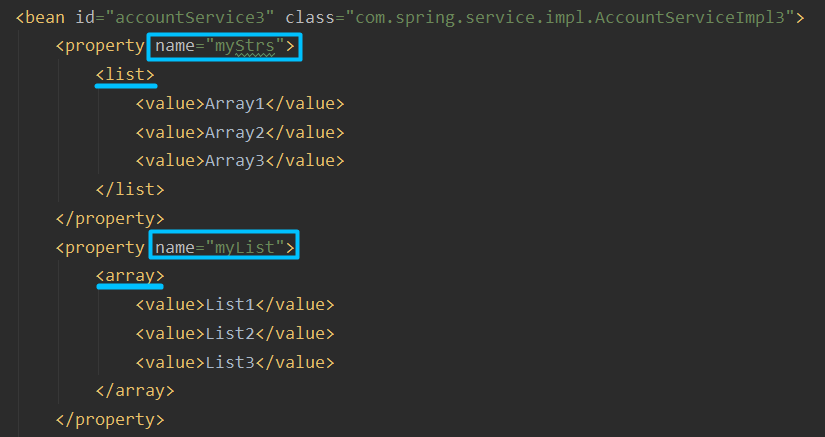
输出结果仍然和没有换标签是一样
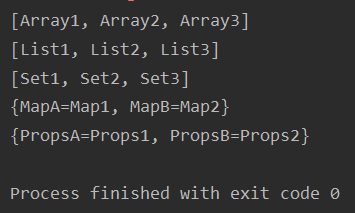
2.4 依赖注入
待续












